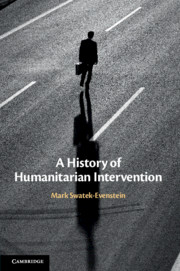Book contents
- A History of Humanitarian Intervention
- A History of Humanitarian Intervention
- Copyright page
- Epigraph
- Contents
- Acknowledgements
- Introduction
- 1 The Battlegrounds of a History of ‘Humanitarian Intervention’
- 2 A History of ‘Humanitarian Intervention’ in Nineteenth-Century International Law
- 3 ‘Humanitarian Intervention’ in the Era of the League of Nations
- 4 The World after 1945
- Bibliography
- Index
1 - The Battlegrounds of a History of ‘Humanitarian Intervention’
Published online by Cambridge University Press: 23 January 2020
- A History of Humanitarian Intervention
- A History of Humanitarian Intervention
- Copyright page
- Epigraph
- Contents
- Acknowledgements
- Introduction
- 1 The Battlegrounds of a History of ‘Humanitarian Intervention’
- 2 A History of ‘Humanitarian Intervention’ in Nineteenth-Century International Law
- 3 ‘Humanitarian Intervention’ in the Era of the League of Nations
- 4 The World after 1945
- Bibliography
- Index
Summary
In April 1917, Warren Harding, at the time a US Senator and later the twenty-ninth President of the United States, declared in a speech that eighteen years prior, the United States had ‘unsheathed the sword […] for the first time in the history of the world in the name of humanity’, and had thus given ‘proof to the world at the time of an unselfish nation’.1 Harding was referring to the American intervention in the Cuban struggle for independence from Spanish colonial rule, which eventually culminated in the Spanish–American War of 1898. In the preceding years, American public opinion had long been in favour of action against Spanish mis-rule, which had included brutal policies of ‘reconcentración’, the forced relocation of more than 400,000 people to the vicinity of the ports, and their internment in camps.2 The situation had eventually led to an intervention by the United States, declared in a resolution by Congress as the reaction to the ‘abhorrent’ conditions in Cuba, which had ‘shocked the moral sense of the people of the United States’ and had been considered ‘a disgrace to the Christian civilisation’.3 William McKinley, then President of the United States, had then told the world that it had been necessary ‘in the cause of humanity’ to put an end ‘to the barbarities, bloodshed, starvation and horrible miseries’ in Cuba: ‘It is no answer to say this is all in another country, belonging to another nation, and is therefore none of our business. It is our special duty, for it is right at our door’.4
Keywords
- Type
- Chapter
- Information
- A History of Humanitarian Intervention , pp. 8 - 41Publisher: Cambridge University PressPrint publication year: 2020

